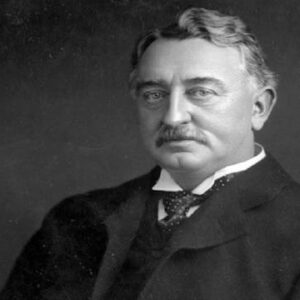Cecil Rhodes, the founder of De Beers, was a well-known South African businessman and politician of British ancestry. He was a staunch supporter of British colonization and once fantasized about founding his own secret society to bring the entire world under British dominion. He was born into a large family and was sent to South Africa to labor at the age of 16. ‘Diamond fever’ was sweeping the region at the time, and Rhodes decided to cash in on it. He toiled at diamond mines for years before founding the De Beers Mining Company and then forming De Beers Consolidated Mines with Barnie Barnato. With his election to the Cape Parliament, he entered politics as well, eventually becoming the colony’s Prime Minister. He believed that the Anglo-Saxon race was the greatest and that Britain should govern the entire world. He was so convinced of this concept that he spent his personal riches to try to build the empire. He affected the development of British Imperialism in Africa as a politician by enacting a number of measures. He was also a philanthropist, donating a significant portion of his immense fortune to the Rhodes Scholarship at Oxford University.
Childhood and Adolescence
Reverend Francis William Rhodes and his wife Louisa Peacock Rhodes raised Cecil Rhodes in Hertfordshire, England. His father was a Church of England vicar.
He went to Bishop’s Stortford Grammar School, but he had asthma and had to be taken out of class due to health problems.
Rhodes was moved to South Africa when he was 16 in the hopes that his health might improve in a warmer climate. Herbert, his brother, was already employed there.
Cecil John’s Career
In 1870, he arrived in South Africa and joined his brother on his cotton plantation.
During that period, it was just recently found that diamonds were plentiful in the Kimberley area. In 1871, the Rhodes brothers went to work in open-pit mines as part of the diamond rush. They made a small fortune and learned a lot about the diamond business in the process.
He went to England to finish his studies in 1873. He enrolled at Oxford’s Oriel College, but only lasted for a term before returning to South Africa. Before completing his B.A. degree in 1881, he traveled back and forth between Oxford and South Africa.
Over the next few years, he worked hard in the diamond business, and with the help of N. M. Rothschild & Sons, he began purchasing all of Kimberly’s lesser diamond mining enterprises.
In 1880, he founded the De Beers Mining Company. He also co-founded the Goldfields of South Africa with his brother Frank, which included numerous huge mines in the Transvaal.
His aim was to enlarge the British Empire to encompass the entire world, and he was a staunch admirer of British Imperialism. In 1880, he was elected to the Cape Parliament as a result of his political activities.
Barnie Barnato, with whom he formed the De Beers Consolidated Mines in 1888, was one of his strongest adversaries in the diamond business.
In 1889, he founded the British South Africa Company (BSAC), and in 1890, he was elected Prime Minister of the Cape.
He invaded Mashonaland and Matabeleland after obtaining a royal license from the British Empire. The BSAC quickly gained control of a large area of land, which was called Rhodesia in 1895.
In December 1895, he backed the Jameson Raid, a planned attack on the Transvaal. The attack failed, although it did result in the capture of Rhodesia’s administrator, Leander Jameson. Because of this occurrence, Rhodes had to resign as Prime Minister of the Cape Colony.
The failure of the Jameson Raid led to the commencement of the Anglo-Boer War in 1899. After his death in 1902, the war came to a conclusion.
His Major Projects
He started the De Beers diamond company, which currently sells roughly 40% of all raw diamonds. The corporation is the world’s largest diamond producer, with operations in open-pit, underground, coastal, and deep-sea mining in South Africa, Botswana, and Namibia.
He worked hard as a politician to bring as much land under the British Empire as possible. Over the course of his political career, he is credited for bringing almost one million square kilometers of African country under British control.
Personal History and Legacy
He never had a wife. He had a close friendship with Neville Pickering, which led to speculation that he was homosexual. Pickering’s death had a devastating effect on Rhodes, adding to the speculation.
His pal Leander Jameson was a close friend of his. Jameson looked after Rhodes in his dying days, and even after Rhodes’ death, he continued to live in the mansion the two had shared.
Throughout his brief life, he was afflicted by illness. He suffered his first heart attack while he was just in his twenties, and his condition deteriorated as he grew older. In 1902, at the age of 48, he died of heart failure.
At the time of his death, he was a very wealthy man, and in his final will and testament, he gave a large sum to Oxford University for the formation of the Rhodes scholarships, which will allow selected international students to study at the university.
His will also established The Rhodes Trust, a charitable organization that provided finances for the creation of Rhodes University in South Africa.
Estimated Net worth
Cecil is one of the wealthiest politicians and one of the most well-known. Cecil Rhodes’ net worth is estimated to be $1.5 million, according to Wikipedia, Forbes, and Business Insider.
Trivia
Catherine Radziwill, a Polish princess, had pursued him and proposed marriage, which he turned down.
This well-known politician and businessman fantasized about founding a secret club to bring the entire world under British domination.


